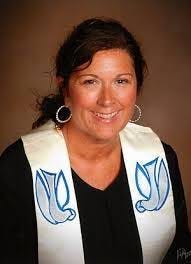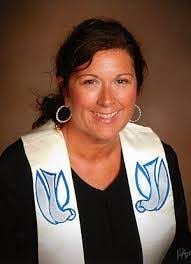Rev. Kelley Becker

Rev. Kelley Becker is senior minister of Disciples Christian Church in Bartlesville.
.When I moved to Bartlesville almost six years ago, the beautiful space that is the Tower Center at Unity Square, between the Price Tower and the Community Center, was but a twinkle in the eyes of community leaders. Even as plans were shared with the public and construction began, having lived here only a short time, I wasn’t sure what to think about the project. I mean, Johnstone and Sooner parks are well-maintained, great public spaces to gather, play, and relax. I wondered if we really needed this new place.
Thankfully, community leaders had a vision beyond what I could see at the time, and that vision has become wonderful reality. Unity Square has it all: location, beauty, a stage with lighting and sound, plenty of space to watch a play or listen to a concert, have a picnic, or play in the water under the gorgeous glass flowers of the water feature. On the website associated with Unity Square, the inspiration for the flowers is explained, “This interactive art installation celebrates the unity of our community as our “Third Place” – an urban destination where every person is welcome…” One of the core values of the church I serve is “welcome,” so I know making a place welcoming to all people is a tall order.
Unity Square and all public spaces are for the entire community to enjoy. Of course, not all the events held in our public spaces will appeal to everyone. Each of us can choose whether to attend any of the events that take place in our public spaces, including Unity Square. If you don’t enjoy theater, you absolutely do not have to attend the plays performed. If live music is not your thing, don’t feel obligated to come to a concert. And if you are not interested in supporting the LGBTQ+ community, do not attend the annual Pride event. Personally, I don’t like Christian rock music, so I find other things to do when there is a concert at Unity Square, but I support other folks being able to enjoy it.
Leading up to and since Pride, there has been a good deal of discussion about whether performances by drag queens should be allowed in public spaces, specifically, Unity Square. The narrative around what drag queens are and what their performances entail has been distorted to paint a picture that is just not accurate. So, I contacted Granny Rainbow, one of the drag queens who performed at Pride, and asked some questions which Granny graciously answered. My experience has taught me that listening and learning bring the community together, whereas petitions generally draw lines and force people to pick a side.
I asked Granny to talk to me about the origins of drag performance. She said the word DRAG is an acronym used historically in theater, to indicate a “man dressed as a girl.” Because there were situations in which women were not allowed to perform on stage, men played the roles of women. Certainly, we have all seen movies and plays where men have dressed up as women. The Robin Williams movie, “Mrs. Doubtfire,” comes to mind for me. Today, drag queens are generally, but not always, simply gay men who enjoy dressing up in women’s clothes to perform.
When I told Granny there were people upset about the drag performance at Bartlesville’s Pride event, she asked me what the specific objection was. I told her that there are concerns that the performances are “sexually charged,” and should not be seen by children. I was at the drag show that day, so I know what it was like. Critics of the drag show have reported all kinds of ridiculous things. The truth is children did not put money in the G-strings of the performers. There were no G-strings. All areas of the body you would expect to be covered at a public pool were covered at the drag show. There was dancing, lip syncing, laughter, color, joy, and community.
I asked Granny why drag queens are an important part of Pride celebrations and she talked to me about Stonewall. On June 28, 1969, the gay club, Stonewall Inn, became the site of the Riots. In the early hours of the morning, New York City police, known for their harassment of the gay community, raided the Stonewall Inn.
Fed up, customers, including drag queens, and neighborhood residents, fought back. The scene eventually exploded into a full-blown riot, with protests that lasted for five more days. It is this now-famous event that paved the way for the modern gay rights movement in the United States. Drag queens have been part of the struggle for rights from the beginning and should be included in our Pride celebrations today.
I asked Granny why, after 30 years, amid controversy and unkindness, she continues to perform. She told me she loves it, it’s fun, and she enjoys expressing that part of herself. She said there is no hidden motive or agenda, it is simply entertainment. Granny pointed out that the children in the audience know and love people in the LGBTQ+ community. They are their teachers, neighbors, siblings, parents, and teammates and, as cherished members of our community, should be welcomed. Before we ended our conversation, I asked her if there was anything she wanted y’all to know about drag and she said this, “Performing in drag lets people know you can be whoever you want to be and you don’t have to conform. You can be you.”
I don’t know why we wouldn’t want that message in our public spaces. In a world where so many people aren’t sure if who they are is enough, drag queens proclaim, “Yes, a thousand times, yes. You are absolutely enough.” And if that is not a message you want to hear, if that is not a message you want your children to hear, stay home during Pride. But don’t forget, if you want your Christian concerts, then your neighbors get to have their drag shows. That’s how freedom works. Public spaces are for all of us, and we are always better together.








